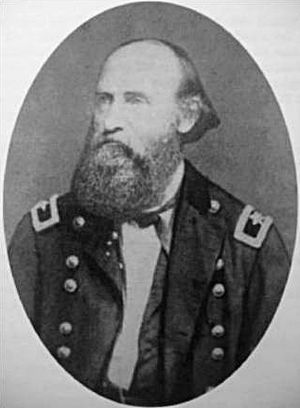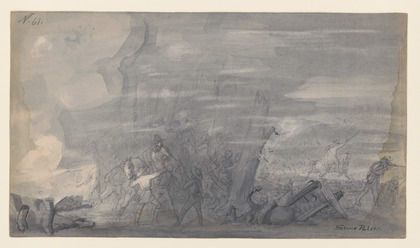August Willich facts for kids
Quick facts for kids
August Willich
|
|
|---|---|

Brigadier General August Willich, c. 1863
|
|
| Birth name | Johann August Ernst von Willich |
| Born | November 19, 1810 Braunsberg, East Prussia, Prussia |
| Died | January 22, 1878 (aged 67) St. Marys, Ohio, U.S. |
| Place of burial |
Elmgrove Cemetery, St. Marys, Ohio
|
| Allegiance | |
| Service/ |
|
| Years of service | 1828–1846 1861–1865 |
| Rank | Second Lieutenant (Prussian Army) |
| Unit | 9th Ohio Infantry Regiment 7th (1st Westphalian) Field Artillery Regiment |
| Commands held | 32nd Indiana Infantry Regiment Horn Brigade |
| Battles/wars | German revolutions of 1848–49
|
August Willich (November 19, 1810 – January 22, 1878) was a brave military officer. He started his career in the Prussian Army in Germany. He was also an early supporter of communism, a political idea about shared ownership. In 1847, he gave up his noble family title. Later, he moved to the United States. There, he became a general in the Union Army during the American Civil War.
Contents
Early Life and European Adventures
Willich was born in Braunsberg, a place in East Prussia. His father was a captain in the army during the Napoleonic Wars. Sadly, his father died when August was only three years old. August and his older brother were then raised by the family of Friedrich Schleiermacher, a famous thinker.
Becoming a Prussian Officer
August Willich received a military education in Potsdam and Berlin. He became an officer in the Prussian Army. He served in the 7th Field Artillery Regiment. In 1846, he decided to leave the army. He believed in a government where people had more power, like a republic. His letter of resignation was so strong that he was arrested and faced a military trial. But he was found innocent and allowed to resign.
A Revolutionary in Europe
Willich was a leader of a group called the Communist League. He played an active part in the Revolutions of 1848–49. These were times when people across Germany fought for more freedom. In 1849, he led a group of volunteer soldiers called a Free Corps in an uprising. Friedrich Engels, a famous revolutionary writer, served as his helper. After the uprising failed, Willich moved to London, England. He learned to be a carpenter there to earn a living.
Moving to America
In 1853, Willich came to the United States. He first worked as a carpenter at the Brooklyn Navy Yard. Soon, people noticed his skills in math and science. He then found a better job helping with coastal surveys. In 1858, he moved to Cincinnati, Ohio. He became the editor of a German-language newspaper called the German Republican. He continued this work until the American Civil War began in 1861.
Serving in the American Civil War
When the Civil War started in 1861, Willich helped recruit German immigrants in Ohio. He joined the 9th Ohio Infantry as a first lieutenant. He was promoted to major in August of that year. He fought in western Virginia at the Battle of Rich Mountain.
Leading the 32nd Indiana Infantry
Later, Governor Oliver P. Morton asked Willich to lead the 32nd Indiana Infantry Regiment. This was a special regiment made up entirely of German-American soldiers. Willich trained his regiment very well, using German commands. They were known for being very professional. He cared a lot about his soldiers. He even ordered ovens to be built so they could have fresh bread. This earned him the nickname "Papa."
Key Battles and Promotions
The 32nd Indiana became famous for its fight at Rowlett's Station, Kentucky. A small group of 500 of Willich's men fought off 1,300 Confederate soldiers. They used a special formation called a "hollow square" and pushed the attackers back.
The 32nd also fought bravely at the Battle of Shiloh. During this battle, Willich showed great leadership. When his troops were struggling, he stood in front of them, with his back to the enemy. He led them through military drills and had the band play "La Marseillaise," a song of freedom. This helped his troops regain their courage, and they launched a successful attack.

In July 1862, Willich was promoted to brigadier general. He fought at the Battle of Perryville in Kentucky. In December, he commanded a brigade at the Battle of Stones River. During this battle, his horse was shot, and he was captured by the Confederates. He was held prisoner for four months but was later released in a prisoner exchange.
Returning to Command
Willich returned to the Union Army in 1863. He led a brigade during the Tullahoma Campaign, where his troops were important in holding Liberty Gap. He also led a division at the Battle of Chickamauga.
During the Chattanooga Campaign, Willich's brigade captured Orchard Knob. Even though they were only ordered to clear the base of the ridge, Willich bravely ordered an attack up Missionary Ridge. This attack defeated the Confederate forces, ending the siege and opening the way for the invasion of Georgia. The 32nd Indiana and the 6th Ohio were among the first to reach the top.
Willich's 32nd Indiana also took part in the Atlanta Campaign with General William Tecumseh Sherman. Willich was wounded at the Battle of Resaca, Georgia. After this, he was promoted to brevet major general. He was then put in charge of Union posts in Cincinnati and other areas.
After the War
After the war ended, Willich returned to Cincinnati, Ohio. He worked for the government, holding important jobs like auditor for Hamilton County. His old home at 1419 Main Street in Cincinnati is still standing today.
In 1870, he went back to Germany. He offered to help the Prussian army during the Franco-Prussian War. However, because of his age, health, and his past political views, they did not accept his offer. He stayed in Germany long enough to earn a college degree in philosophy from the University of Berlin. He was sixty years old at the time!
Willich then returned to the United States. He passed away in St. Marys, Ohio, and was buried in Elmgrove Cemetery there.
See Also
 In Spanish: August Willich para niños
In Spanish: August Willich para niños
- List of American Civil War generals (Union)
- German Americans in the Civil War
 | Misty Copeland |
 | Raven Wilkinson |
 | Debra Austin |
 | Aesha Ash |

